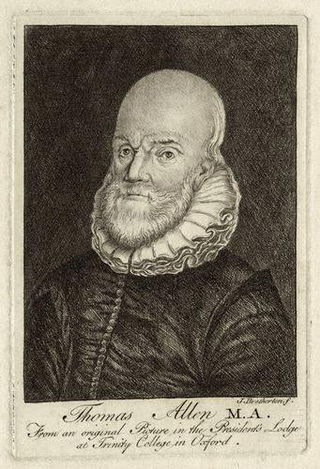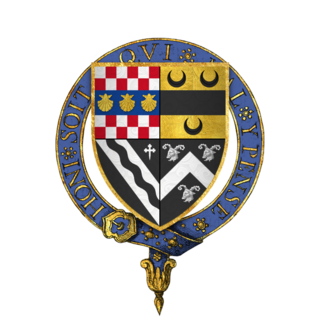Related Research Articles
Frederick Apthorp Paley, was an English classical scholar.

The Keeper or Master of the Rolls and Records of the Chancery of England, known as the Master of the Rolls, is the President of the Civil Division of the Court of Appeal of England and Wales and Head of Civil Justice. As a judge, the Master of the Rolls is second in seniority in England and Wales only to the Lord Chief Justice. The position dates from at least 1286, although it is believed that the office probably existed earlier than that.

Thomas Allen (or Alleyn) (21 December 1542 – 30 September 1632) was an English mathematician and astrologer. Highly reputed in his lifetime, he published little, but was an active private teacher of mathematics. He was also well connected in the English intellectual networks of the period.

Robert Rochester was an English Catholic and Comptroller of the Household and a member of the Privy Council in the reign of Mary I.

Sir Tobie Matthew, born in Salisbury, was an English member of parliament and courtier who converted to Roman Catholicism and became a priest. He was sent to Spain to promote the proposed Spanish Match between Charles, Prince of Wales, and the Spanish Infanta, Maria Anna of Spain, for which mission he was knighted. He left England after being accused of leading Catholics in 1641 and retired to Ghent.

Edward Arden was an English nobleman and head of the Arden family, who became a Catholic martyr.

Justice of the Common Pleas was a puisne judicial position within the Court of Common Pleas of England and Wales, under the Chief Justice. The Common Pleas was the primary court of common law within England and Wales, dealing with "common" pleas. It was created out of the common law jurisdiction of the Exchequer of Pleas, with splits forming during the 1190s and the division becoming formal by the beginning of the 13th century. The court became a key part of the Westminster courts, along with the Exchequer of Pleas and the Court of King's Bench, but with the Writ of Quominus and the Statute of Westminster, both tried to extend their jurisdiction into the realm of common pleas. As a result, the courts jockeyed for power. In 1828 Henry Brougham, a Member of Parliament, complained in Parliament that as long as there were three courts unevenness was inevitable, saying that "It is not in the power of the courts, even if all were monopolies and other restrictions done away, to distribute business equally, as long as suitors are left free to choose their own tribunal", and that there would always be a favourite court, which would therefore attract the best lawyers and judges and entrench its position. The outcome was the Supreme Court of Judicature Act 1873, under which all the central courts were made part of a single Supreme Court of Judicature. Eventually the government created a High Court of Justice under Lord Coleridge by an Order in Council of 16 December 1880. At this point, the Common Pleas formally ceased to exist.

The position of Dean Ireland's Professor of the Exegesis of Holy Scripture was established at the University of Oxford in 1847. This professorship in the critical interpretation or explanation of biblical texts, a field known as exegesis, was instituted by John Ireland, who was Dean of Westminster from 1816 until his death in 1842. He founded scholarships in his lifetime at the University of Oxford, which are still awarded after an examination to undergraduates "for the promotion of classical learning and taste". In his will, he left £10,000 to the university, with the interest arising to be applied to the professorship. The first professor, Edward Hawkins, was appointed in 1847. The second Dean Ireland's Professor, Robert Scott, had won an Ireland scholarship in 1833 while studying at Christ Church.
The English College of St Gregory was a Roman Catholic seminary in Seville, Spain. It was founded by the English Jesuit Robert Persons in 1592, when Roman Catholicism was illegal in England, to provide his native country with priests. The dedication of the college to St Gregory recalls the Gregorian mission of AD 596, which resulted in the Anglo-Saxons being converted to Christianity.
Arthur Phillips was an English musician and composer. He was organist of Magdalen College, Oxford, and Heather Professor of Music at the University of Oxford. He converted to Catholicism and resigned his positions in 1656 to travel to France to become organist to Queen Henrietta Maria, widow of the executed King Charles I.
References
- 1 2 A History of the Pontifical English College of Sts Peter and Paul Lisbon
- 1 2 3 4 s:Historical account of Lisbon college/Chapter 1
- 1 2 3 4 Herbermann, Charles, ed. (1913). . Catholic Encyclopedia . New York: Robert Appleton Company.
- ↑ Herbermann, Charles, ed. (1913). . Catholic Encyclopedia . New York: Robert Appleton Company.
- ↑ Williams, Michael E. "Newman, William". Oxford Dictionary of National Biography (online ed.). Oxford University Press. doi:10.1093/ref:odnb/67456.(Subscription or UK public library membership required.)
- 1 2 Williams, Michael E. "Waring, Humphrey". Oxford Dictionary of National Biography (online ed.). Oxford University Press. doi:10.1093/ref:odnb/8698.(Subscription or UK public library membership required.)
- ↑ "English College Lisbon". Archived from the original on 2011-01-30. Retrieved 2011-02-25.
- ↑ Orders, d'Arcy (1995). "The Inglezinhos. A short history". British Historical Society of Portugal Annual Report. 22: 97. Retrieved 15 March 2022.
- ↑ Norris, A.H. (1979). "The English College, Lisbon". British Historical Society of Portugal Annual Report. 6: 15. Retrieved 15 March 2022.
- ↑ s:Historical account of Lisbon college/Chapter 2
- ↑ "Convento dos Inglesinhos". Archived from the original on 2011-05-23. Retrieved 2011-02-25.
- ↑ "Bleasdale, John Ignatius (1822–1884)". Australian Dictionary of Biography. National Centre of Biography, Australian National University.
- ↑ McConnell, Anita. "Booth, Edward". Oxford Dictionary of National Biography (online ed.). Oxford University Press. doi:10.1093/ref:odnb/1431.(Subscription or UK public library membership required.)
- ↑ Murphy, G. Martin. "Bramston, James Yorke". Oxford Dictionary of National Biography (online ed.). Oxford University Press. doi:10.1093/ref:odnb/3242.(Subscription or UK public library membership required.)
- ↑ Herbermann, Charles, ed. (1913). . Catholic Encyclopedia . New York: Robert Appleton Company.
- ↑ Herbermann, Charles, ed. (1913). . Catholic Encyclopedia . New York: Robert Appleton Company.
- ↑ Whitehead, Maurice. "Gooden, Peter". Oxford Dictionary of National Biography (online ed.). Oxford University Press. doi:10.1093/ref:odnb/10964.(Subscription or UK public library membership required.)
- ↑ Handley, Stuart. "Goter, John". Oxford Dictionary of National Biography (online ed.). Oxford University Press. doi:10.1093/ref:odnb/11127.(Subscription or UK public library membership required.)
- ↑ Herbermann, Charles, ed. (1913). . Catholic Encyclopedia . New York: Robert Appleton Company.
- ↑ "Bishop Victor Guazzelli dies (obituary) | Cardinal | Roman Catholic Diocese of Westminster". www.rcdow.org.uk. Archived from the original on 2007-09-30.
- ↑ Bradley, G. "Hall, Thomas". Oxford Dictionary of National Biography (online ed.). Oxford University Press. doi:10.1093/ref:odnb/11991.(Subscription or UK public library membership required.)
- ↑ Hogg, James. "Hogg, James". Oxford Dictionary of National Biography (online ed.). Oxford University Press. doi:10.1093/ref:odnb/11995.(Subscription or UK public library membership required.)
- ↑ Scragg, Brenda J. "Haydock, Thomas". Oxford Dictionary of National Biography (online ed.). Oxford University Press. doi:10.1093/ref:odnb/12748.(Subscription or UK public library membership required.)
- ↑ Hesketh, Roger. "Hesketh, Roger". Oxford Dictionary of National Biography (online ed.). Oxford University Press. doi:10.1093/ref:odnb/13127.(Subscription or UK public library membership required.)
- ↑ Williams, Michael E. "Pickford, Edward". Oxford Dictionary of National Biography (online ed.). Oxford University Press. doi:10.1093/ref:odnb/7113.(Subscription or UK public library membership required.)
- ↑ Machado de Sousa, M. Leonor. "Russell, Richard". Oxford Dictionary of National Biography (online ed.). Oxford University Press. doi:10.1093/ref:odnb/75037.(Subscription or UK public library membership required.)
- ↑ Jordan, Ruth. "Tylden, Thomas". Oxford Dictionary of National Biography (online ed.). Oxford University Press. doi:10.1093/ref:odnb/10861.(Subscription or UK public library membership required.)
- ↑ Herbermann, Charles, ed. (1913). . Catholic Encyclopedia . New York: Robert Appleton Company.
- ↑ Southgate, Beverley. "White, Thomas". Oxford Dictionary of National Biography (online ed.). Oxford University Press. doi:10.1093/ref:odnb/29274.(Subscription or UK public library membership required.)
- Attribution
![]() This article incorporates text from a publication now in the public domain : Herbermann, Charles, ed. (1913). "Patriarchate of Lisbon". Catholic Encyclopedia . New York: Robert Appleton Company.
This article incorporates text from a publication now in the public domain : Herbermann, Charles, ed. (1913). "Patriarchate of Lisbon". Catholic Encyclopedia . New York: Robert Appleton Company.